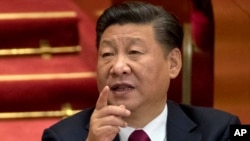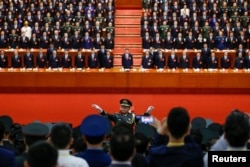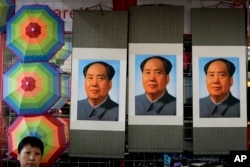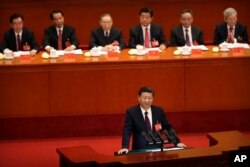China’s Communist Party has agreed to add the political thought of Chinese leader Xi Jinping to its constitution, putting him on par with the country’s founder Mao Zedong and further consolidating his power ahead of a top level leadership reshuffle.
The move to amend the Communist Party constitution also bolsters growing anticipation that Xi could remain China’s most influential leader for some time to come, analysts said.
The revision was approved at the closing session of the once-in-five-year party congress on Tuesday. State media heralded the party’s vote to write “Xi Jinping Thought on Socialism With Chinese Characteristics for a New Era” into the constitution “historic.”
The vote passed with no opposition and no abstentions. It also puts Xi in a unique position.
All of Xi’s predecessors have had their political ideas written into the party constitution, but only Mao and Xi had their name and vision added to the document while they were still in office.
Much like Mao’s leadership and Deng Xiaoping’s “reform and opening up,” which each stretched for three decades, Xi is aiming to do the same, said political scientist Yang Kai-huang.
“It seems clear that Xi’s ambition is that his approach to governance and national strategy plan will be used all the way until 2050,” Yang said.
According to the amendment, “Xi Jinping Thought” will serve as a guide for China’s development on a “long-term basis” and that it must be “adhered to and steadily developed.”
In addition to adding his name and political ideals to the document, the amendments also established the party’s “absolute” leadership over the military and society as a whole.
The revisions said a sweeping anti-corruption drive would continue and gave prominence to Xi Jinping’s trillion dollar global trade and development plan, known as “The Belt and Road” initiative.
In his address at the opening ceremony Xi pledged the party would turn China into a modern socialist country by 2035 and a leading global power by 2050.
“All of these goals, including the “one belt one road,” and so forth, these are decades long projects and they do give the justification for Xi Jinping staying [around], at least beyond 10 years,” said veteran China watcher Willy Lam.
There are some rules and regulations that could keep that from happening.
For example, Xi is currently 64 years old and unwritten party rules require leaders 68 and older to step down. Also, China’s Constitution says the president can only serve for two terms.
But given that his name has now been written into the party constitution and that he also is regarded as the party’s “core leader,” no real obstacles remain, analysts said.
Lam said Xi could give up his position as president and step aside as party chairman, but retain control over China’s Central Military Commission, much like Deng Xiaoping did. He could also remain chairman of the country’s national security commission, which is in charge of the nation’s police.
“According to long established tradition, whomever controls the army and the police controls everything, not to mention the fact that he has this additional title of core leader,” Lam said. “Even though it is a symbolic title, there are no stipulations about retirement age or tenure for the core leader, so the core leader is pretty much the core leader for life.”
In addition to that, analyst note that Xi currently does not have any clear successors. Who joins the party’s powerful Standing Committee will provide some clues, analysts said. That announcement is expected to come around noon on Wednesday.
The party’s Politburo Standing Committee currently has seven members, but analysts have said it could shrink to five or be expanded to at least nine. What is clear already is that China’s second most powerful man, Wang Qishan, will not return.
Wang is China's top graft-buster and head of the party's Central Commission for Discipline Inspection.
Wang’s name was not included in a list of members on the party’s Central Committee released Tuesday, a sign that the 69-year-old would be stepping aside. Some analysts suggest, however, that he could take up some other senior role instead.







